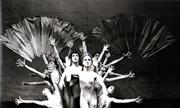Equus - Segal Centre of Arts
SATURDAY, OCTOBER 1, 2011
Equus
I gotta be honest – I’m just a humble Fringe theatregoer, used to quick and dirty one-hour plays. So as I headed to the Segal Centre on a Wednesday afternoon for the matinee performance of Equus,I found myself a little daunted by the prospect of a two-and-a-half hour play about an insane teenager who’s obsessed with horses. Within the first few minutes, however, my fears were assuaged and I remained completely captivated for the entire length of the show. We are guided through the play by a somewhat dry but likeable narrator, a sort of straight-man character: the psychiatrist Dr. Dysart. In the opening scene, the doctor is talked into taking on yet another patient – 17-year-old Alan Strang, who has just suffered a psychotic episode in which he blinded a stable full of horses. For the rest of the show, we follow Dysart’s journey into madness as he tries to unveil the secrets of Strang’s mind.
Dan Jeannotte’s performance as the young Strang is incomparable. His portrayal of the character’s fervour, both religious and sexual, is mesmerizing. Throughout the play, we witness his madness gradually infect those around him. His parents, whose antagonistic relationship undoubtedly contributed to the intensity of Alan’s character, are horrified by their son’s actions and slowly become unhinged. Only the irredeemably bland character of Jill Mason seems relatively clueless as to the depths of Alan’s madness. In the end, even the ever-calm Dysart is on his knees, clinging to his sanity and peace of mind. The last lines of the play, uttered desperately by the doctor as he cradles his head in his hands, left me shuttering.
The entire performance contrives to manipulate the audience’s emotions in the same powerful way.
The set, with its dizzying curves contrasted with austere, straight shapes, perfectly conveyed the haunting, claustrophobic nature of the play as well as reflected the characters’ relationships: if Alan is represented by the untameable curving floorboards, the supposedly sane people in his life are depicted by the tall poles which stand authoritatively all around him but which he nevertheless manages to shake loose. The actors’ deliberate movements would at times be more accurately described as choreography, as with any scene featuring the hauntingly graceful horse-men. Though it’s subtler, the same can also be said of certain scenes involving the doctor and Alan’s mother, with their careful, slow pacing and long pauses; or of Alan engaging with curiosity and abandon with pieces of the set at the far end of the stage as the doctor delivers a soliloquy. Every aspect of this play is aimed at dragging the viewer into the mind of a madman and forcing them to question their sense of reality – and I can only say that in my case at least, they completely pulled it off. Equus is a fairly well-known play, with good reason, and this cast did an amazing job of doing it justice. It’s only on until tomorrow, and if you get the chance, I highly recommend trying to scramble for a last-minute ticket.
-Vic, B.U.
![/images/pictures/Sarah[1].jpg](../images/pictures/Sarah%5b1%5d_thumbnail.jpg)
